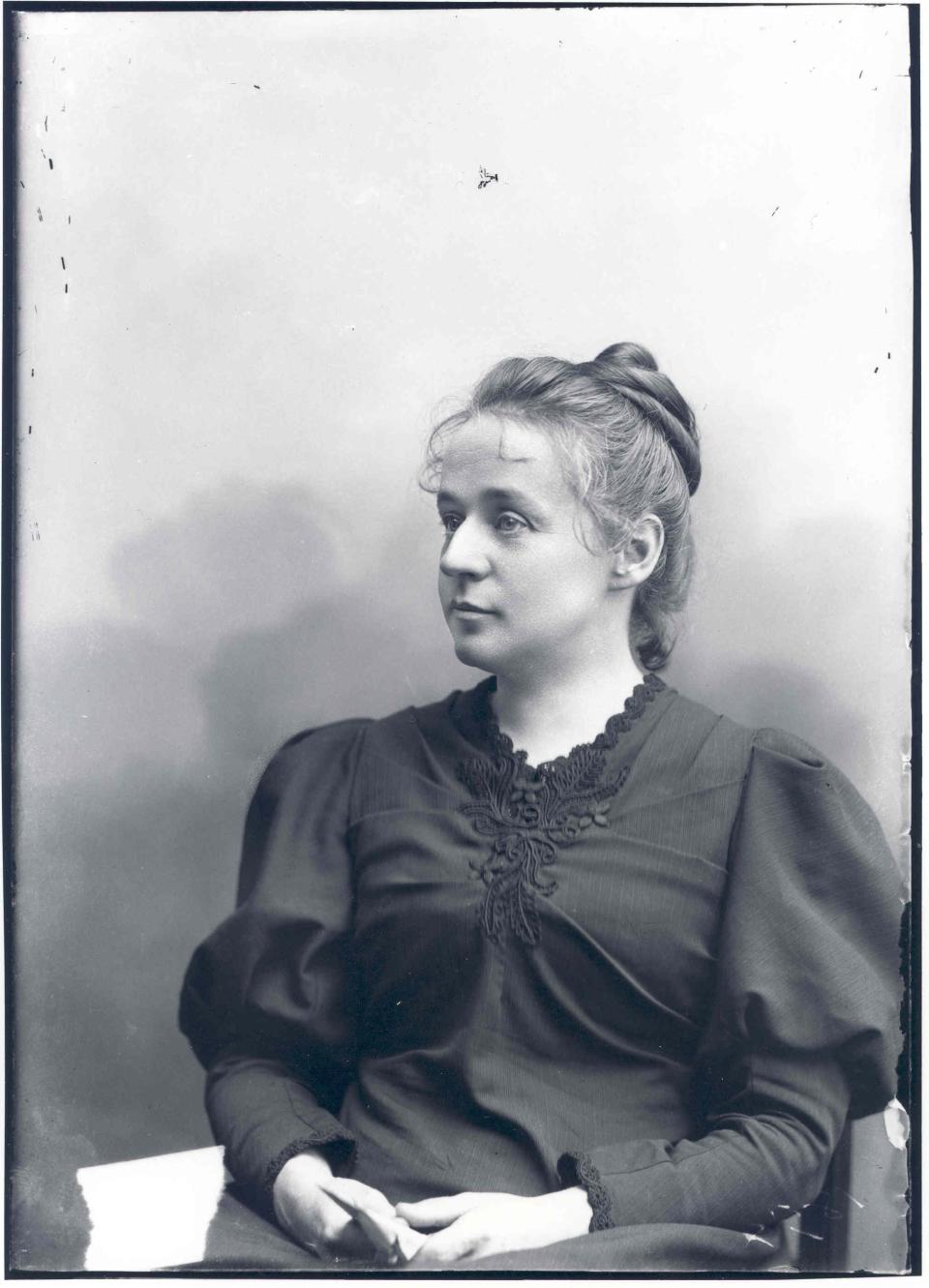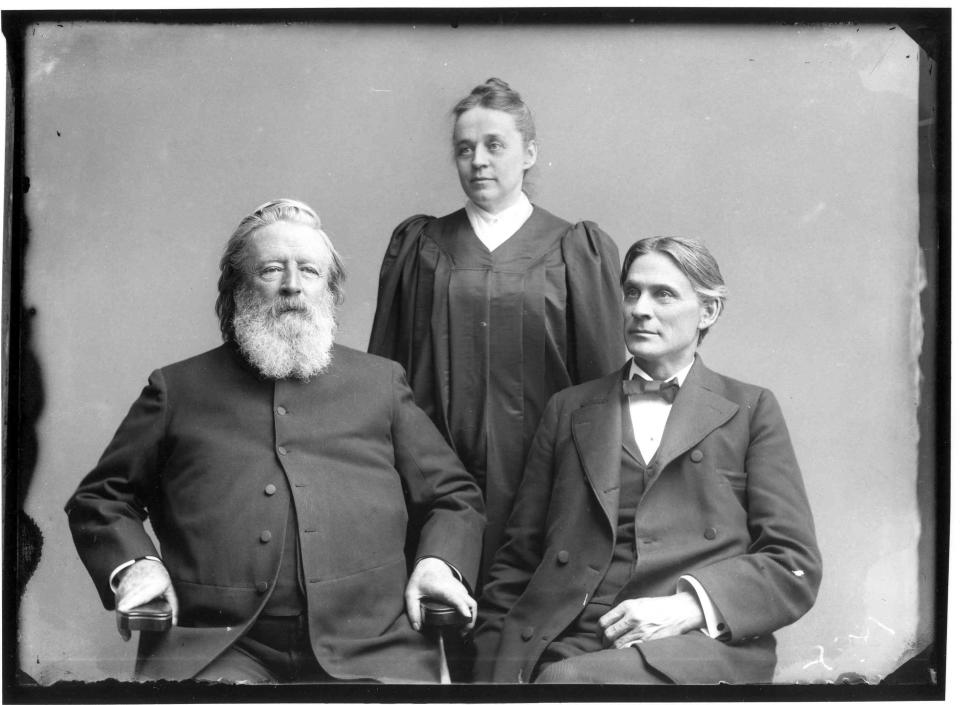This Elmira woman broke barriers, fought for women's suffrage. Meet Annis Ford Eastman
- Oops!Something went wrong.Please try again later.
In 1899, when a police matron was to be appointed, Elmira Mayor Edgar Denton named the Rev. Annis Ford Eastman and Dr. Anna G. Stewart as civil service commissioners to conduct the examination. It seemed to make sense, since the police matron must be a woman, women should have something to say about the choice to be made.
But the law was the “rub.” It provided that “not more than two of the commissioners shall belong to the same political party” and since women could not vote, the argument was “they cannot belong to any party. Not being capable of party membership women are not eligible as civil service commissioners.” The newspaper fueled the argument by claiming “the mayor committed a palpable and undemocratic violation of the law in naming them. Anyway independent of the legal question the appointment was absurd.” (Elmira Daily Gazette and Free Press May 26, 1899)
This glimpse of the Rev. Annis Ford Eastman gives us a sense of her involvement in the Elmira community. At her passing in 1910 a committee of local pastors issued the following statement: “But large and exacting as were her activities in her own church, she found time and inclination to respond to the countless calls from the city and far beyond.
"The values and measure of this service will never be known on earth." (Star Gazette, October 26, 1910)
The Rev. Annis Ford Eastman and her husband, the Rev. Samuel Eastman, became co-pastors of The Park Church in 1900 upon the death of the Rev. Thomas K. Beecher. They had served as Beecher’s associate pastors since 1894.

Annis Bertha Ford was born April 24, 1852 in Peoria, Illinois. Her father was a successful gunsmith, whose violent temper and addiction to alcohol made Annis’ girlhood a difficult one. Her parents eventually separated and Annis and her four sisters “passed judgment on their family situation by espousing feminism and seeking independent careers.” (Notable American Women 1607-1950)
Annis prepared for a teaching career at Oberlin College. While at college she met Samuel Eastman, the son of a circuit riding minister studying at Oberlin Theological Seminary. They were married on Aug. 25, 1875. Between 1875 and 1881 they moved three times because of Samuel’s parish appointments and had four children, three boys and a girl. Apparently the stress of marriage, and a lung condition dating from his Civil War service brought a collapse in Samuel’s health and he abandoned his career as a preacher.
With Samuel’s collapse, Annis became the main breadwinner. She began teaching at the Canandaigua Granger Place school but quickly moved into a ministerial career. She first preached in a parish church at Brookton near Ithaca, N.Y. She was very successful and indeed on Nov. 12, 1889 “although her theological knowledge was based only on assisting her husband prepare his sermons she was regularly ordained a Congregational minister — one of the denomination’s first women clergy.” (Notable American Women 1607-1950)
It is interesting to note that Thomas K. Beecher publicly supported her ordination. His support was a bit ironic. According the Myra Glenn, his biographer, Beacher “initially balked at the prospect of a woman becoming a minister much less serving as a pastor at Park Church.” He reportedly told a friend “that if male ministers ordained one woman, soon hundreds of other women would seek ordination in order to get in the pulpit where they can talk.”
But in 1889 he publicly supported her ordination. He noted that “Annis Eastman had started ministering in order to assist her ailing husband and provide for their financially strapped family.” Glenn noted that “such reasons made Annis Eastman’s ordination more acceptable to Beecher and other male colleagues.” By 1894 Beecher was openly campaigning for Samuel and Annis Eastman to become his associates. (Thomas K. Beecher, Minister to a Changing America)
In the early 1890s, Annis Eastman’s fame as a preacher grew. “It depended … less upon the originality of her ideas than upon the impact of her charm and compelling personality.” (Notable American Women)

In 1893, she addressed the Women’s Congregational Congress and the World’s Parliament of Religion at the World’s Columbian Exposition in Chicago. She championed women’s suffrage from an early age. In 1893, during a worship service at the National American Woman Suffrage Association national meeting, Susan B. Anthony introduced Eastman as the movement’s main “orthodox woman minister” referring to Eastman’s continuation of regular ministry while also working as a suffrage activist to that point an anomaly among suffragist clergywomen. (New York Daily Tribune, January 16, 1893) (Eastman’s daughter, Cyrstal Eastman would co-author the Equal Rights Amendment in 1923).
With the death of Thomas K. Beecher, Samuel, whose health had improved, and Annis Eastman became the joint pastors of The Park Church. “The Eastmans were excellent preachers. Their sermons were simple and direct in style, but full of substance. Mrs. Eastman had a remarkable gift of speaking directly to the hearts of her hearers. Mr. Eastman was the more profound scholar, especially in the fields of history and philosophy ...” (A History of the Park Church)
According to “A History of the Park Church” “the most discussed event of the Eastman ministry was the ‘changing of the creed.’ … “The Eastmans’ concern about the creed grew up in a period when a considerable struggle was on throughout Protestantism between conservatives and liberals.”
Eva Taylor, author if the History of the Park Church wrote, “We believe it was not only a desire to line up The Park Church with the liberal camp that motivated the Eastmans, but also a desire to keep The Park Church a place where people of different private opinions could work together.” The book Notable Women states “she changed the already liberal Park Church form Congregational to Unitarian without protest from its supporters.”
Annis Eastman’s ministry and mission was active. According to various newspaper accounts she spoke about the “ideal home” which is the “soil of which all values have grown” achieved by recognizing the equality of men and women.” (Elmira Gazette and Free Press Oct. 3, 1894)
Reviving history: This 140-year-old Elmira mansion needs millions in work. Why a mother and daughter bought it
She lectured on poetry and spoke to the children of The Park Church publishing “in simple and attractive book form … her children’s sermons.” (Elmira Daily Gazette and Free Press March 8, 1901) She spoke out on Women’s Suffrage writing a letter to the Star Gazette (Jan. 9, 1909) “The reason for the extension of the franchise to women range themselves in my mind under two heads: 1. The need of women 2. The need of the state.”
Annis Eastman died the morning of Oct. 22, 1910. Her remains were cremated and she is buried Woodlawn Cemetery in Canandaigua. Her husband Samuel Eastman remained pastor of The Park Church until his retirement if 1917. He died in 1925.
According to “Notable American Women 1607-1950,” “Mrs. Eastman’s impact was local; she was never the national figure which many of her contemporaries became as feminists. But her mind and personality shaped the careers of two of her children. Max and Crystal, who became reformers and intellectuals of national importance and gave many of her ideas a wider circulation.”
— Jim Hare writes a monthly history column.
This article originally appeared on The Evening Tribune: Elmira's Annis Ford Eastman was a trailblazer with nationwide impact

